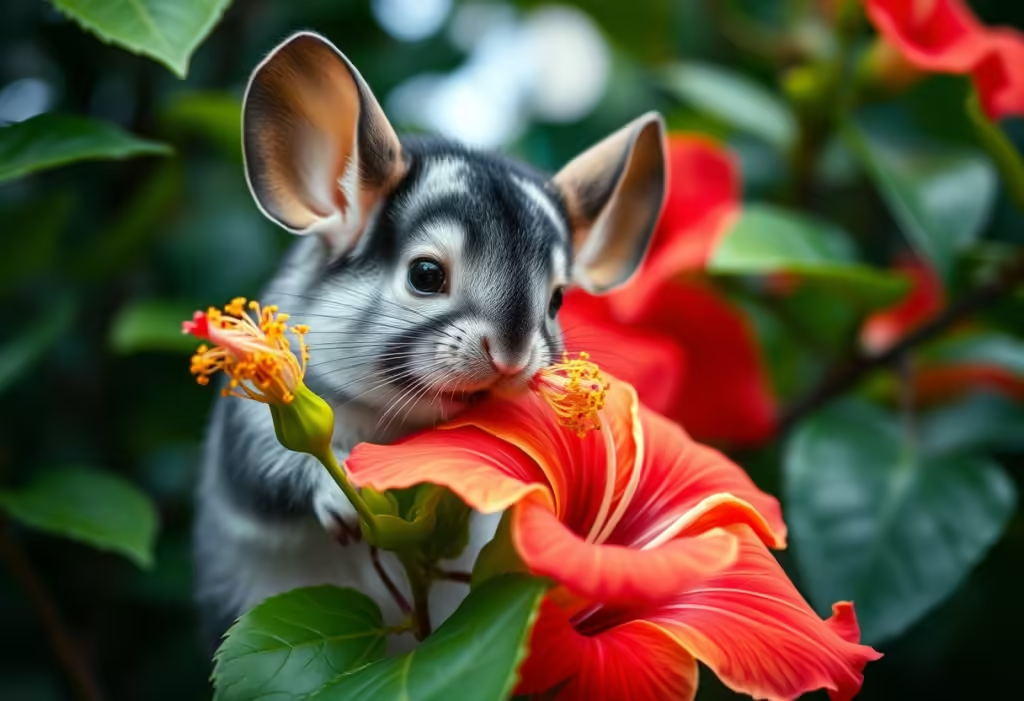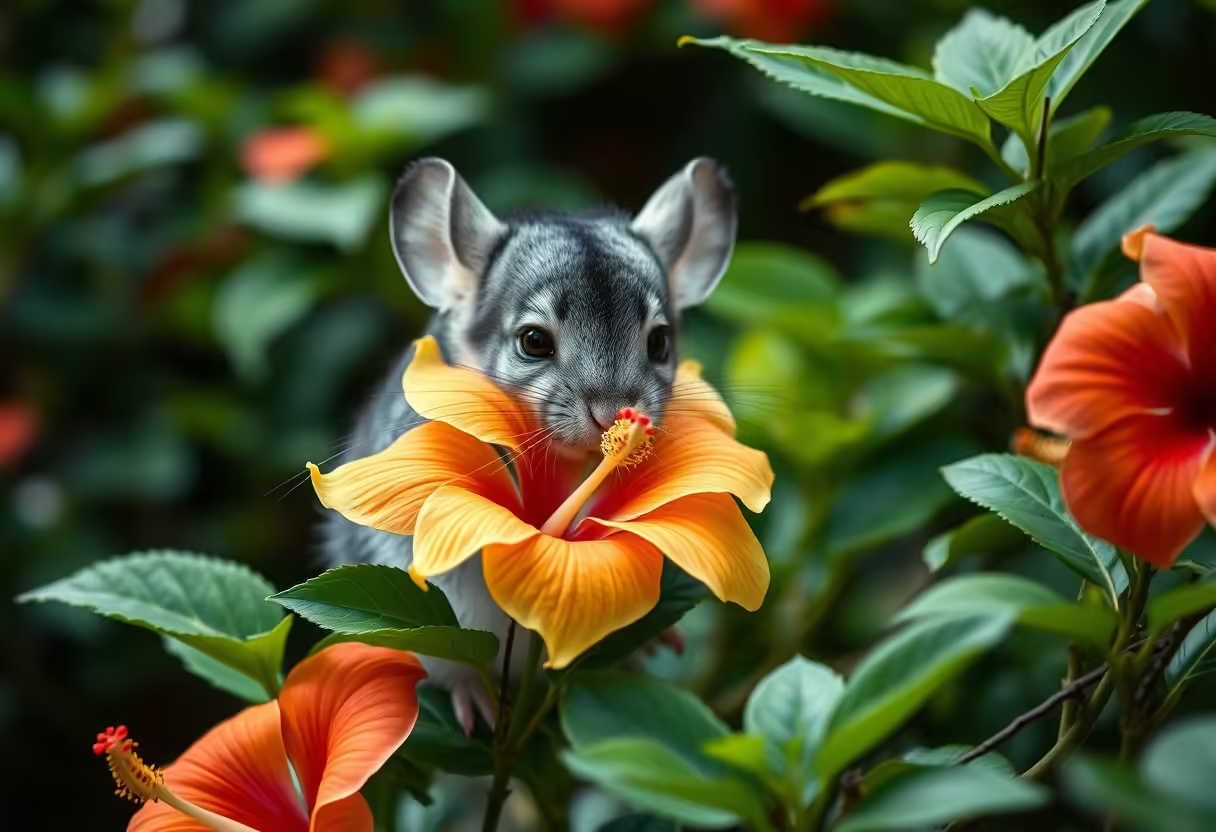Chinchillas can safely eat hibiscus flowers in moderation, as they are non-toxic. However, due to their sensitive digestive systems, overconsumption of hibiscus may lead to digestive issues. It is always best to consult your veterinarian before introducing any new foods, including hibiscus, into your chinchilla’s diet. This article will guide you through the benefits and potential risks of hibiscus flowers, helping you make informed decisions for your furry friend.
Key Takeaways:
- Hibiscus Safety: Chinchillas can safely eat hibiscus flowers in moderation.
- Health Benefits: Hibiscus flowers provide antioxidants and vitamins.
- Moderation is Key: Always introduce hibiscus slowly and ensure it does not make up a large portion of their diet.
Nutritional Benefits of Hibiscus Flowers
Hibiscus flowers offer several nutritional benefits that can support your chinchilla’s overall health. These blooms are visually appealing and can provide variety in their diet, making mealtime more exciting.
Vitamins and Minerals
Hibiscus flowers are rich in vitamin C and essential minerals, which play a crucial role in boosting your chinchilla’s immune system. This can help keep your pet vibrant and active while promoting long-term health.
Antioxidants
Hibiscus flowers are a source of antioxidants, which help combat oxidative stress and reduce cellular damage caused by free radicals. These compounds can support your chinchilla’s immune system and potentially extend their lifespan by mitigating the effects of aging and illness.
While hibiscus offers health benefits, it’s important to feed it in moderation to prevent any adverse reactions.
Potential Risks of Feeding Hibiscus to Chinchillas
Although hibiscus flowers are non-toxic, feeding them in excess may lead to health issues. It’s essential to introduce hibiscus gradually and observe your chinchilla for any negative reactions.
Allergic Reactions
Some chinchillas may experience allergic reactions to hibiscus. Symptoms could include itching, swelling, or digestive distress. If you notice any unusual behavior after introducing hibiscus, stop feeding it immediately and consult your vet.
Digestive Issues
Chinchillas have sensitive digestive systems, and hibiscus, with its higher moisture content, can cause digestive upset such as diarrhea or bloating if consumed in large amounts. To avoid this, always introduce hibiscus slowly and feed only in small portions. If digestive issues occur, remove hibiscus from the diet and seek veterinary advice.
Recommendations for Feeding Hibiscus
When feeding hibiscus flowers to your chinchilla, take care to ensure they are safe, pesticide-free, and introduced gradually. Hibiscus should be a treat, not a staple, in your chinchilla’s diet.
Fresh vs. Dried Hibiscus
Both fresh and dried hibiscus flowers can be safe for chinchillas. Fresh flowers offer natural moisture and nutrients, while dried flowers provide a more concentrated flavor and longer shelf life. Whether fresh or dried, always ensure the flowers are pesticide-free and intended for animal consumption.

Portion Control
As with any treat, portion control is essential. Offer no more than one fresh flower or a teaspoon of dried hibiscus per week. This prevents overconsumption and helps maintain a balanced diet. Always monitor your chinchilla for signs of discomfort after introducing hibiscus.
Alternatives to Hibiscus Flowers
If you’re concerned about feeding hibiscus to your chinchilla, there are many other safe and nutritious options available.
| Flower | Safety for Chinchillas | Nutritional Benefits |
|---|---|---|
| Dandelion | Safe | Rich in vitamins A and C |
| Marigold | Safe | Anti-inflammatory properties |
| Rose Petals | Safe | Mild antioxidant properties |
| Chamomile | Safe | Soothes digestion and anxiety |
These flowers can add variety to your chinchilla’s diet while providing essential nutrients without the risks associated with some flowers.
Other Safe Treat Options
Apart from flowers, chinchillas enjoy a range of safe treats that can enrich their diet. Fresh hay should always be the primary food source, but you can also offer small amounts of fruits like apples or pears, or dried herbs such as chamomile and mint. These treats, when given in moderation, can provide variety while keeping your chinchilla healthy and satisfied.
Summing Up
Chinchillas can eat hibiscus flowers in moderation, but it’s important to ensure they are free from pesticides and chemicals. Introduce hibiscus slowly, watching for any adverse reactions, and prioritize a diet of hay, pellets, and occasional safe treats. By staying informed about what foods are safe for your chinchilla, you can keep your pet healthy while occasionally offering enjoyable treats like hibiscus flowers.
FAQ
Q: Can chinchillas eat hibiscus flowers?
A: Yes, chinchillas can eat hibiscus flowers in moderation. Hibiscus flowers are non-toxic and provide nutrients such as vitamin C, but they should only be given occasionally as treats.
Q: Are there any health benefits for chinchillas eating hibiscus flowers?
A: Yes, hibiscus flowers contain antioxidants and vitamin C, which can help support a chinchilla’s immune system. However, they should not replace a regular diet of hay and pellets.
Q: How should hibiscus flowers be prepared for chinchillas?
A: Ensure hibiscus flowers are fresh and pesticide-free. Wash them thoroughly and offer them whole or torn into smaller pieces. Gradually introduce the flowers to monitor for any adverse reactions.
Q: Can chinchillas eat dried hibiscus flowers?
A: Yes, dried hibiscus flowers are safe for chinchillas but should be given in limited amounts. Since dried flowers are more concentrated, offer them as an occasional treat.
Q: What should I do if my chinchilla has an adverse reaction to hibiscus flowers?
A: Stop feeding hibiscus immediately if your chinchilla shows signs of discomfort such as diarrhea or lethargy. Contact your vet to ensure your pet’s well-being.
